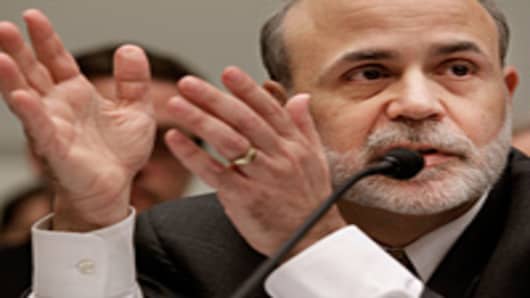The blame for the uncertainty that surrounds Tuesday’s meeting of the Federal Open Market Committee (FOMC) should perhaps be placed on Federal Reserve Chairman Ben Bernanke's leadership style, or lack of it.
In ways that may not be well appreciated by markets, Bernanke has redefined the role of chairman of the Fedfrom his predecessor Alan Greenspan. Bernanke sees himself less as the leader of the FOMC than its moderator.
And with the economic outlook uncertain and the committee divided, that attempt to straddle the middle has shown up in the uncertainty over what the Fed will do Tuesday.
The Fed has been overtaken by policy paralysis as the economy has weakened and the Fed has found itself behind the curve.
Three recent examples from Bernanke stand out:
In the wake of the devastating European financial crisis and an already obvious slowdown in the US economy, Bernanke doggedly stuck to the FOMC party line on exit strategies in his semi-annual testimony to Congress in July. The testimony contained a lengthy section on how the Fed could “normalize” its balance sheet, (read: reduce its size and "tighten" policy).
“A second way to normalize the size and composition of the Federal Reserve's securities portfolio would be to sell some holdings of agency debt and MBS [mortgage-backed securities],” Bernanke testified.
"In the wake of the European financial crisis and a slowdown in the US economy, Bernanke doggedly stuck to the party line on exit strategies in his Congressional testimony in July."
Yet just nine days later, St. Louis Fed President Jim Bullard, generally thought of as a hawk on monetary policy, appeared on CNBC arguing for the Fed to massively change its policy and consider "expanding" its balance sheet.
Three days after Bullard’s July 30 appearance, Bernanke passed on another opportunity to lead. He gave an economic speech in South Carolina in which he talked extensively about the economic challenges, including the drag from the cutback in state and local government spending, but he said nary a word about potential policy responses from the Fed. (A side note: Since the Fed chairman very rarely takes questions from the media, we could not ask him.)
The lack of forceful leadership showed up as far back as June. Looking at the minutes from the Fed meeting that month, a glaring omission becomes obvious. At that meeting, a majority of the FOMC concluded that the US economy would not hit its inflation or unemployment goals for “up to five or six years.”
That’s a rather astonishing admission from the stewards of the economy, and missing was the leadership to push the committee for a response. Something like, “Hey guys, judging by your own forecast, we’re not going to get there for half a decade. What are you going to do about it?”
Pressed during his Congressional testimony, Bernanke did acknowledge three responses the Fed could take to help a weakening economy. But he has yet to explain what good any of them would do.
Why would increasing excess reserves in the banking system spur the economy? What good would come from extending the period during which the Fed promises to keep interest rates “exceptionally low?” And why would cutting the 25 basis points the Fed pays on excess reserves down to zero spur lending?
It’s worth pointing out that this lack of leadership is at odds with how the chairman acted during the financial crisis. Facing panic, Bernanke showed himself capable of leading and running out in front of his committee. He led the Fed to adopt a series of innovative programs to stabilize credit markets and the banking system.
Bernanke may be gun-shy after the strong criticism that came from those actions. But the way he’s running things now is often how he said he wanted to do his job. He has a well-known distaste for the way Greenspan acted like a "macroeconomic superstar." Bernanke felt the Fed chairman should be much less out in front of his committee and much less involved in the political debate over economic policy.
Those ideas may make for better policy during normal times, but in the wake of the biggest financial crisis since the Great Depression, it does not yet appear to be time for normal policy. That means the Fed chairman still needs to lead his committee, not just to moderate it.



